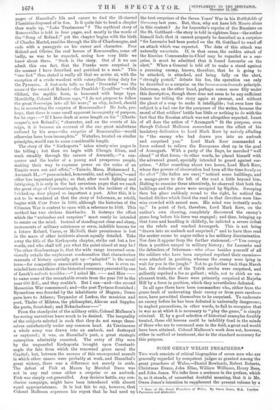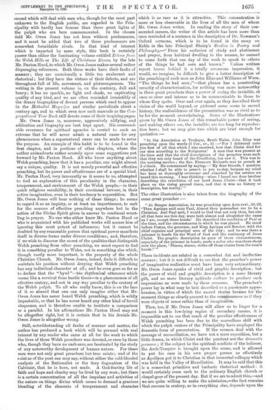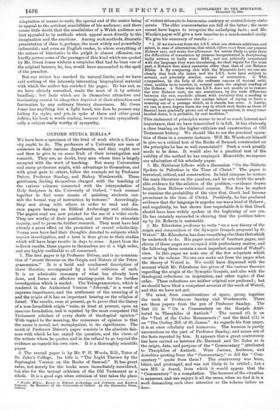SOME GREAT WELSH PREACHERS.* This work consists of critical biographies
of seven men who are generally regarded by competent judges as greatest among the great preachers of Wales,—Daniel Rowlands, Robert Roberts, Christmas Evans, John Elias, William Williams, Henry Rees, and John Jones. We infer from a sentence in the preface, which is, as it stands, of somewhat doubtful meaning, that it is Mr. Owen Jones's intention to supplement the present volume by a
* Some of the Great Preachers of Wales. Ry Open Ames, M.A. Loudon Passniore and Alabaster. second which will deal with men who, though for the most part unknown to the English public, are regarded in the Prin- cipality with hardly less honour than these great lights of the pulpit who are here commemorated. In the chosen field Mr. Owen Jones has not been without predecessors, and it must be added that two of these predecessors are somewhat formidable rivals. In that kind of interest which is imparted by mere style, this book is certainly poorer than either the fascinating volume entitled Echoes from the Welsh Hills or The Idle of Christmas Evans, by the late Mr. Paxton Hood, to which Mr. Owen Jones makes several rather disparaging references. Both these works have their faults of manner ; they are occasionally a little too exuberant and rhetorical ; but they have the virtues of their defects, and are throughout full of life, movement, and picturesqueness. The writing in the present volume is, on the contrary, dull and heavy ; it has no sparkle, no light and shade, no captivating quality of any kind, and we are often reminded irresistibly of the dreary biographies of devout persons which used to appear in the Methodist Magazine and similar periodicals about a century ago, and to which even now such manuals as the Con- gregational Year Book still devote some of their inspiring pages.
Mr. Owen Jones is, moreover, aggressively edifying, and edification and biography are best kept apart. His commend- able reverence for spiritual agencies is carried to such an extreme that he will never admit a natural cause for any phenomenon when a supernatural cause can be made to serve the purpose. An example of this habit is to be found in the first chapter, and in portions of other chapters, where the author animadverts rather severely upon some suggestions put forward by Mr. Paxton Hood. All who know anything about Welsh preaching, know that it has a peculiar, one might almost say a unique, quality. It is not merely powerful and effective preaching, but its power and effectiveness are of a special kind. Mr. Paxton Hood, very innocently as it seems to us, attempted to find an explanation of this peculiarity in the character, temperament, and environment of the Welsh people,—in their quick religious sensibility, in their emotional fervour, in their active imagination, even in their tendency to superstition. But Mr. Owen Jones will hear nothing of these things ; he seems to regard it as an impiety, or at least an impertinence, to seek for the sources of effective preaching anywhere but in the action of the Divine Spirit given in answer to continual wrest- ling in prayer. No one who either knew Mr. Paxton Hood or who is acquainted with his published works will accuse him of ignoring this most potent of influences ; but it cannot be doubted by any reasonable person that spiritual power manifests itself in diverse forms under diverse conditions ; and, therefore, if we wish to discover the secret of the qualities that distinguish Welsh preaching from other preaching, we must expect to find it in something peculiar to Wales, not in something else which, though vastly more important, is the property of the whole Christian Church. Mr. Owen Jones, indeed, finds it difficult to maintain his position without denying that Welsh preaching has any individual character at all ; and he even goes so far as to declare that the " hywl "—the rhythmical utterance which seems like a survival from herdic times—is a phenomenon of all effective oratory, and not in any way peculiar to the oratory of the Welsh pulpit. To all who really know, this is on the face of it so absurd that one can only imagine either that Mr. Owen Jones has never heard Welsh preaching, which is wildly improbable, or that he has never heard any other kind of fervid eloquence, and is therefore unable to institute a comparison or a parallel. In his affirmations Mr. Paxton Hood may not be altogether right, but it is certain that in his denials Mr. Owen Jones is altogether wrong.
Still, notwithstanding all faults of manner and matter, the author has produced a book which will be perused with real interest by any reader who cares at all for the work to which the lives of these Welsh preachers was devoted, or even by those who, though they have no such care, are fascinated by the study of any noteworthy development of human nature. For these men were not only great preachers but true saints ; and of the saint as of the poet one may say, without either the cold-blooded analysis of the Rationalist or the fiery dogmatism of the Calvinist, that he is born, not made. A God-fearing life of faith and hope and charity may be lived by any man; but there is a certain concentration of all the impulses and activities of the nature on things divine which seems to demand a gracious blending of the elements of temperament and character which is as rare as it is attractive. This concentration is more or less observable in the lives of all the men of whom Mr. Owen Jones writes. In reading the story of their con- secrated careers, the writer of this article has been more than once reminded of a sentence in the description of Dr. Newman's Oxford sermons, which is to be found in the essay on Keble in the late Principal Shairp's Studies in Poetry and Philosophy,—" From his seclusion of study and abstinence and prayer, from habitual dwelling in the unseen, he seemed to come forth that one day of the week to speak to others of the things he had seen and known." Unless written report leaves behind it a totally erroneous impression, it would, we imagine, be difficult to give a better description of the preaching of such men as John Elias and Williams of Wern. "The things he had seen ;"—that phrase has a penetrating veracity of characterisation, for nothing was more noteworthy in these great preachers than a power of seeing the invisible, at once so clear and intense as to be communicable to those to whom they spoke. Over and over again, as they described their vision of the world beyond, or pictured some scene in sacred history, the realisableness of the presentation was so vivid as to be for the moment overwhelming. Some of the illustrations given by Mr. Owen Jones of this remarkable power of seeing, and making others see, the invisible, are too long for reproduc- tion here ; but we may give two which are brief enough for quotation :—
" In the Association at Tredegar, South Wales, John Elias was preaching upon the words (1 Cor., xv., 3) For I delivered unto you first of all that which I also received, how that Christ died for our sins according to the Scriptures.' A man that was present at the time said that the vivid descriptions of the preacher were such that they not only heard of the Crucifixion, but saw it. This was in the morning service ; the Rev. Ebenezer Richards was to preach at 2 o'clock. He commenced by saying,—' My dear friends, I question whether I shall be able to preach to you to-day, because my mind has been so thoroughly overcome and absorbed by the sermon we heard this morning. I was thinking—when I heard our dear brother describing the crucifixion of our Lord Jeans Christ—that it took place on the rising ground there, and that it was no history or description, but reality.' " The other illustration is also taken from the biography of the same great preacher :—
" At Bangor Association, he was preaching upon Acts xxvi., 28,29, Then Agrippa said unto Paul, Almost thou persuadest me to be a Christian. And Paul said, I would to God that not only thou, but also all that here me this day, were both almost and altogether the same as I am, except these bonds.' He described the condition of Paul at the time, and the circumstances in which he was placed. He stood before Festns, the governor, and King Agrippa and Bernice, with the chief captains and principal men of the city ; and he was there a prisoner in bonds for the Word of God and the testimony of Jesus Christ. The graphic description he gave of these circumstances, especially of the prisoner in bonds, made a sailor who was there shout over the place, ' Shame, shame, strike off those chains from the man's hands !' "
These incidents are related in a somewhat flat and ineffective manner ; but it is not difficult to see that the preacher's power of imaginative realisation must have been very extraordinary. Mr. Owen Jones speaks of vivid and graphic description ; but the power of vivid and graphic description is a mere literary gift, and no mere literary aptitude suffices to produce such impressions as were made by these sermons. The preacher's power lay in what may be best described as a passionate appre- hension, in virtue of which the sacred stories became for the moment things as clearly present to the consciousness as if they were objects of sense rather than of imagination.
Then, too, if Mr. Owen Jones will allow us to linger for a moment in this low-lying region of secondary causes, it is impossible not to see that much of the peculiar effectiveness of Welsh preaching has been due to the marvellous skill with which the pulpit orators of the Principality have employed the dramatic form of presentation. If the sermon deal with the message of reconciliation, we have not a mere exposition, but a little drama, in which Christ and the penitent are the dramatis personce ; if the subject be the spiritual conflicts of the believer, the Arch-Tempter is brought upon the scene, and is allowed to put his case in his own proper person as effectively as Apollyon put it to Christian in that immortal colloquy which
was held in the Valley of Humiliation. It may be said that this is a somewhat primitive and barbaric rhetorical method : it
would certainly seem such to the ordinary English church or chapel-goer of the present day. But if we are to admit this,—and we are quite willing to make the admission,—the fact remains that success in oratory, as in everything else, depends upon the adaptation of means to ends, the special end of the orator being to appeal to the quickest sensibilities of his audience ; and there seems little doubt that the sensibilities of a Welsh audience are best appealed to by methods which appeal most directly to the imagination and the emotions. Among such methods, dramatic presentation of ideas is, perhaps, the most widely and powerfully influential ; and even an English reader, to whom everything of the nature of histrionics in the pulpit is almost offensive, can hardly peruse some of the passages of this kind which are quoted by Mr. Owen Jones without a suspicion that had he been one of the original hearers, he, too, would have succumbed to the spell of the preacher.
Bat our review has reached its natural limits, and we have said nothing of the intensely interesting biographical material with which the author has enriched his pages. He has not, as we have already remarked, made the most of it by artistic handling ; but facts which are in themselves attractive and fascinating cannot be altogether deprived of their attraction and fascination by any ordinary literary clumsiness. Mr. Owen Jones has anything but a light hand, nor does he possess any feeling for style ; and yet, in spite of these and other great defects, his book is worth reading, because it treats sympatheti- cally a subject really worthy of sympathy.




















































 Previous page
Previous page